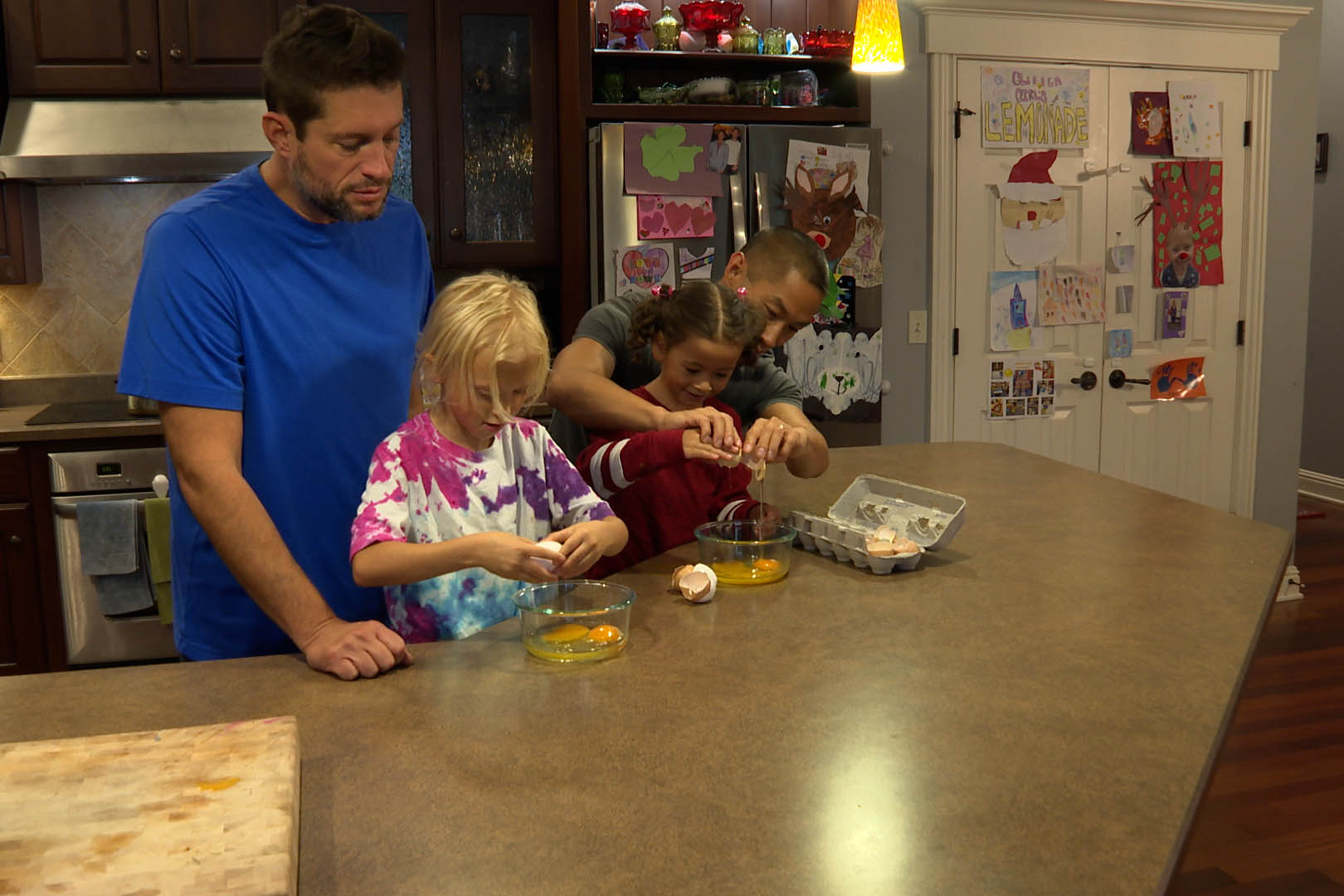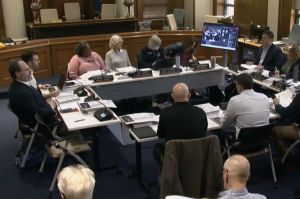
Couples gather in 2014 to be wed, after Indiana's ban was lifted. (WFIU/WTIU News)
Almost 10 years ago, on October 6, 2014, same sex marriage became legal in Indiana. The U.S. Supreme Court declined to hear appeals from Indiana and several other states.
This action upheld the U.S. District Court’s June 25 ruling from that summer, which struck down Indiana’s law banning same sex marriage.
Lobbyist and president of 1816 Pubic Affairs Group, Michael O’Brien, remembers tides on the issue were changing quickly. Then-president Barrack Obama had announced his support of same sex marriage just two years earlier.
But the issue was still divisive in January 2014 for Indiana lawmakers. House republicans introduced a constitutional amendment, House Joint Resolution 3, to ban same sex marriage in Indiana.
O’Brien, who is a republican, worked on a measure to fight against HJR-3.
“I very much felt an obligation to steer the party in the direction I thought it should go,” he said.
Working to protect people’s right to marry who they want was one of the proudest moments of O'Brien's career. It was important to him that the Republican party send a message it was welcoming.
“And, oh my God, what a 10 years it's been not going that direction,” he said. Opponents of same sex marriage in Indiana’s statehouse reacted to stop the cultural shift. The Religious Freedom Restoration Act in 2015 was just one example.
“In 2016 we tried to amend the Civil Rights statute to protect LGBTQ Hoosiers from being fired from their job for being gay or to be evicted from their housing, which failed,” he said. “We still to this day have not passed that.”
Despite continuing political battles for LGBTQ rights, many married gay couples are thriving.
In the last decade, Kevin Howell and Andrew Roberts got married, moved home to Fort Wayne, built and sold a business together, and adopted two daughters.
They got married in Washington D.C. in early 2014 with plans to move back to Indiana, their home state.
Returning to a state where their marriage wasn’t legally recognized was a concern, Roberts said. But they wanted to be near family.
“We feared that unless it became legal nationally, that Indiana would probably be one of the last states to approve it, which did affect us,” Roberts said. “Our plan was to move back to Indiana once (Howell) got out of the Army, and I finished residency, to start a family.”
Howell served in the Army for more than a decade and leans right of center politically. Roberts is running for their county coroner in November as a Democrat.
Howell said that 10 years ago, he was less concerned with full legal recognition of gay marriage. Factors like taxes and parental rights weren't on his mind yet.
“But they're obviously so important," Howell said. "That just wasn't something that I ever thought about in the 17 years prior.”
Nationally, acceptance of same sex marriage dipped slightly last summer, according to a Gallup poll. But it is still markedly higher than 10 years ago.
In 2014, 55 percent of people said they believe same-sex marriages should be recognized by the law with the same rights as heterosexual marriages.This year, it was up to 69 percent.
Howell doesn’t expect everyone to support his marriage. He has friends and family who don’t believe in same-sex marriage, but they still spend holidays and weekends together.
"I co-exist with my friends and family that may not agree with me," he said.
If someone has a different paradigm than him on same sex marriage, he doesn't try to change their mind.
"I'm not going to change my family members or my friend’s paradigm on that," he said. But that doesn't mean that we can't be friends, as long as they don't try to change my paradigm."
"Just treat each other good. That's all you’ve got to do."

In 2014, more than 1,400 same sex couples got married in Indiana, according to the Indiana Department of Health.
Indiana had almost 11,000 married same-sex couples, according to the 2020 U.S. Census.
Statistics from UCLA in 2019 showed that Indiana, adjusted for population, had the 32nd-most gay marriages in the country.
Michah Beckwith, the Republican nominee for Indiana lieutenant governor, believes all people should have the right to have their partnerships legally recognized. But he prefers civil unions, not marriages, for LGBTQ couples.
Beckwith also supports adoption by LGBTQ couples. But he described married, heterosexual couples with children as “the gold standard.”
“We've been lowering the standards of what God said is right, true, and virtuous,” Beckwith said. “We've got to get back to that. And again, it doesn't mean that you're not welcome. It doesn't mean that you don't have a place in society if you have differing opinions. But don't lower the gold standard, because as you do, society will begin to break down, as we're seeing.”
IU Maurer School of Law professor Steve Sanders said this reasoning is problematic legally: setting public rules based on religion is an overstep. A similar argument was made against interracial marriage in the 1950s and 1960s. Sanders cited Loving v. Virginia:
“In 1967, a Virginia judge sentenced a couple criminally for getting an interracial marriage,” Sanders said. “He said god created races and put them on different continents. And if people didn't insist on interfering with his plan, we wouldn't have to deal with something like this. So, there's a very ugly and unfortunate history of the same religious arguments being used against interracial marriage.”
Sanders added marriage exists in every state and using civil unions creates inconsistencies and legal complications for people who move, get divorced, or adopt.
O’Brien said people who support same sex and other LGBTQ marriage need to remain vigilant.
“Fighting the right fight is important, so you don't slide backwards,” O’Brien said.
A 2022 poll from Target Point Consulting says 63 percent of Hoosiers believe same sex marriage should be protected.
According to The Indiana Department of Health, same sex marriages made up around 2 to 3 percent of marriages in Indiana annually from 2014 to 2018.











